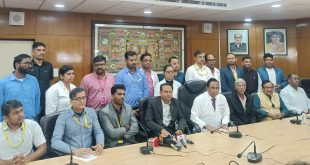Bhubaneswar: Kalinganagar in Odisha’s Jajpur district is one of the 122 cities (non-attainment cities) in India that are worst affected by air pollution.
In the recently released Odisha Star Rating, 5 out of the 6 participating industries from Kalinga Nagar have been rated as one star (lowest environment complaint). According to the University of Chicago’s Air Quality Life Index, the average life expectancy of Kalinga Nagar residents could increase three years if WHO air quality standards are met.
The situation at Kalinga Nagar is critical. But under the National Clean Air Programme (NCAP), State Pollution Control Board is aiming at reducing the air pollution by 30% by 2024 at Kalinga Nagar, said Er. Pramod Kumar Behera, Regional Officer, State Pollution Control Board, Kalinganar.
He was addressing at an awareness workshop jointly organised by State Pollution Control Board, Energy Policy Institute at the University of Chicago (EPIC India) and Tata Center for Development at UChicago(TCD).
Themed as ‘Can citizen engagement contribute towards cleaner air in non-attainment cities’, this workshop witnessed technical presentations on different aspects of air pollution.
Talking on ‘Health Hazards of air pollution’, Dr. Sudhanshu Sekhar Bal, ADMO, FW, told, ‘Morbidity and mortality due to adverse impacts of air pollution have increased at an alarming rate here. Hospitalization and health-related expenses have become manifold.’’
Talking on what a common citizen can do to prevent air pollution, Dr. Sudhamayee Behura, Head of the Department, Environmental Science, Raghunathjew College told, ‘Controlling air pollution at the source level, using right kind of fuel, more dependence on public transport can help.’
Shubhadarshini Das, environmental engineer of the State Pollution Control Board, told that a comprehensive action plan has been prepared for control and abatement of air pollution in the non-attainment cities by different departments of Government of Odisha.
Air Pollution Emergency Response Plan (APERP) is also being prepared for different departments of the Government of Odisha to restore urban air quality and take precautionary measures to minimize health risk at the time of emergency situations in terms of air quality.
Presenting on ‘How Public Disclosure Programs Help in Enhancing Environment Performance and Compliance’, Jyoti Ranjan Nayak, Senior Data Associate, EPIC India, told that to keep industrial air pollution under control, Government of Odisha had started the Odisha Star Rating, public disclosure of pollution data of industries belonging to 17 categories of high polluting sectors in 2018.
The program aims to encourage responsibility and healthy competition between industries in order to reduce emissions and achieve better regulatory compliance.
More than 100 students, faculties and civil society members attended the workshop.
Parambrahma
Tripathy, Communication and Outreach Coordinator of EPIC India proposed the
vote of thanks.
 Update Odisha-Latest Odisha News I Breaking News Get latest news on Odisha, Govt. Jobs, OSSC, OPSC, Entertainment, Crime, Sports, and Education
Update Odisha-Latest Odisha News I Breaking News Get latest news on Odisha, Govt. Jobs, OSSC, OPSC, Entertainment, Crime, Sports, and Education



